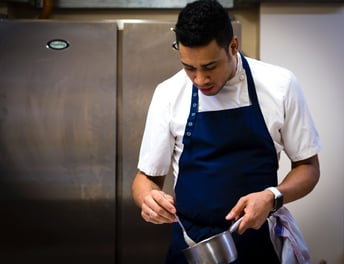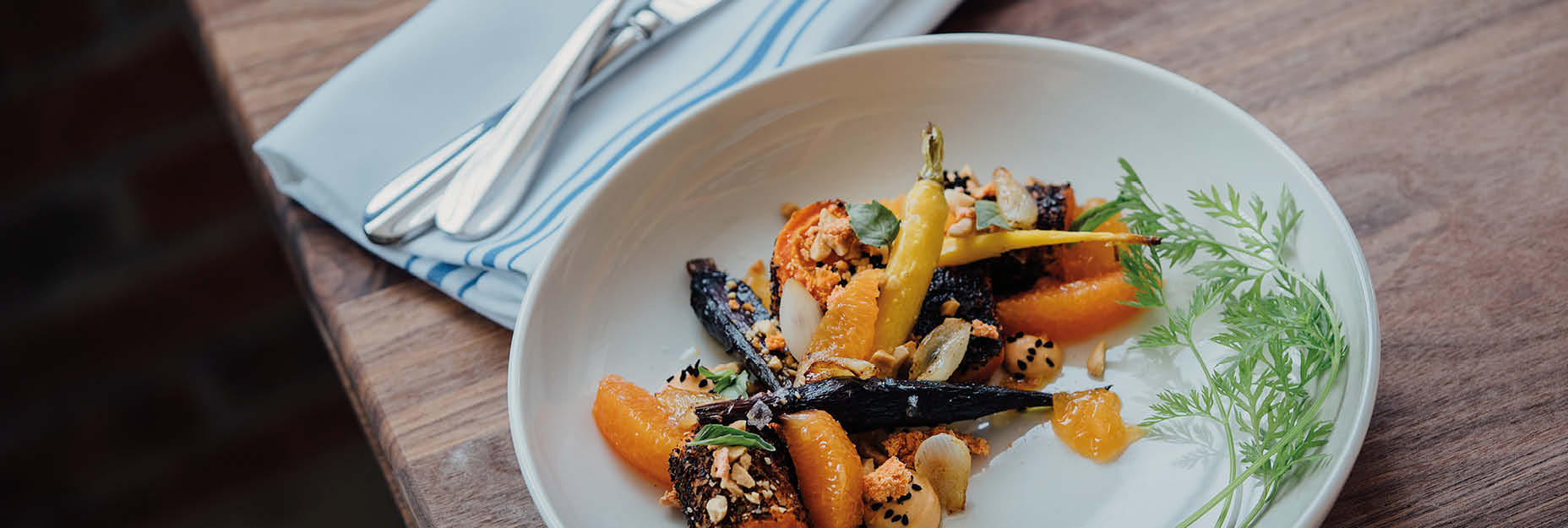Where are chefs finding inspiration for their food? What cooking trends and techniques have been inspiring them recently? Our Winnow Chef's Table series brings you interviews with chefs from all over the world, sharing some insight into their culinary origins and philosophies.
We sat down with Adam Bateman, Group Operations and Development Chef for IHG UK & Ireland, to talk about his journey, sustainability in hotel kitchens, and how AI-powered Winnow Vision, will help IHG manage and reduce food waste.
- What inspired you to become a Chef?
 Cooking wasn’t a primary passion of mine at a young age. I only stumbled across working in kitchens, when I was 16 and I found an apprenticeship at a country hotel & resort. I quickly found my feet and developed a true love for cooking and hotel operations. I just fell in love with the hustle and bustle of the kitchen. And, I admired my Head Chef’s skill and talent so enormously that I wanted to, one day, emulate it. That’s what I set my mind to.
Cooking wasn’t a primary passion of mine at a young age. I only stumbled across working in kitchens, when I was 16 and I found an apprenticeship at a country hotel & resort. I quickly found my feet and developed a true love for cooking and hotel operations. I just fell in love with the hustle and bustle of the kitchen. And, I admired my Head Chef’s skill and talent so enormously that I wanted to, one day, emulate it. That’s what I set my mind to.
- What’s the best part of your job?
A big part of my job as a Group Operations and Development Chef is to provide support for Executive Chefs across our hotels. I help them choose suppliers, recruit staff and develop menu concepts. Because of that, I have been fortunate to travel a lot, and I work with an eclectic selection of teams. My days are never the same and the unpredictability of my role, whilst sometimes challenging, is one of the things I love the most.
- Do you think food waste should be high on the agenda of chefs? Why?
Food waste and waste, in general, are huge topics in our industry at the moment. The issue of food waste is a fundamental part of building a more sustainable future and that’s what we are trying to accomplish at IHG through various different initiatives.
- How do you see your F&B operation becoming more sustainable in the future?
Sustainability for chefs is not only about food waste, but it is also about sourcing local ingredients and choosing the right suppliers. In the future, I see my kitchens offering more locally sourced food, seasonal food, wasting less and significantly decreasing our use of single-use plastic.
- How would you describe Winnow Vision to another Chef?
I would describe Winnow Vision to another chef as a piece of technology that helps chefs monitor, reduce, and control their food waste. In a world whereby this is crucial to success, Winnow Vision is the support they need to succeed.
- What challenges do you feel Winnow Vision could help you solve?
I think Winnow Vision will help us manage our food waste by giving us exposure and additional insight into what is really happening in our kitchens. Just having a full scope of what is going on is a massive help for chefs running large kitchen operations or multiple sites. I believe that this is the main challenge that Winnow Vision will help us overcome.
- What would you say to chefs who think that they don’t have any waste?
For chefs who think that they don't have any food waste, I would ask: How can you keep an eye on the kitchen 24/7? It’s impossible for chefs to know what is going on at all times, although we’d like to think that we can. Hotels are particularly challenging, because they operate all day and night. A lot of mistakes tends to happen during the night or early mornings when senior staff are not in the kitchen to monitor activity. The only way to gain control over the kitchen and effectively manage food waste is to rely on technologies, such as Winnow Vision, that can operate 24/7 over 365 days of the year.
- Is there a chef you admire? Who and why?
I have always been a big fan of Gordon Ramsay. I admire his passion as both a cook and a businessman. Ramsay, as a TV chef, has also done so much for our industry in raising awareness and promoting kitchens as a great place to work and build a career.
- One unforgettable meal. When and where
The five-hour tasting menu that I enjoyed at the Frantzen restaurant, in Sweden, along with another 13 highly esteemed chefs. The food was amazing, of course, but it wasn’t just about the food. The whole experience blew my mind. You could notice that everything was thought through, from the moment that you step inside the elevator to the moment that you leave the restaurant. I feel privileged to have had the opportunity to eat there, and I would recommend it to anyone looking for an exceptional culinary and hospitality experience.
- Best places to eat out in the world?
The UK is the best place to eat out in the world. In big cities like London, Manchester, and Edinburgh, you can sample food from all corners of the world. We have such a diverse food culture. It’s incredible, and we’re lucky to have it all at our fingertips.








Comment on my blog